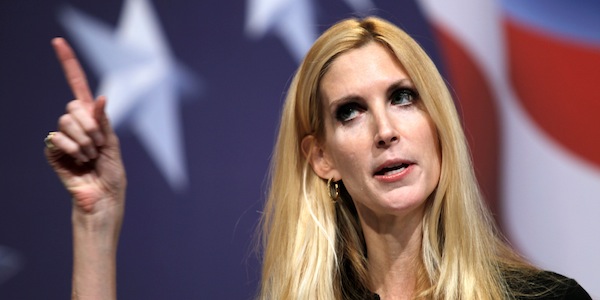The rage, concern, and suffering of oppressed people seem like a game to most conservatives, says Khadijah Costley White.
Over the last few weeks, protests on (and off) social media helped draw international attention to the plight of over 270 girls kidnapped while at school in Nigeria. Using the Twitter hashtag #bringbackourgirls, people across the world rallied to support the ongoing efforts of concerned Nigerian citizens and the girls’ mourning parents to save their daughters. In a beautiful gesture, many Americans claimed these girls as part of our collective family, not much different from other little girls we already love. We stood in solidarity with their plight and shared in the grief for their loss. We demanded their return and pushed our leaders to demand it, too.
And in response, American conservatives mocked it.
The most notable instance of this ridicule came from conservative commentator, Ann Coulter. In a photo posing with a placard, she mimicked an earlier image of the First Lady Michelle Obama holding a sign that read “#bring back our girls.” With an exaggerated grimace that satirized the First Lady’s concerned facial expression, Coulter’s sign instead read “#bring back our country.”
Terrorists abducted nearly 300 girls from their families and, according to various reports, raped, sold, and forcibly converted them to Islam. But all Ann Coulter could see was an opportunity to launch a racially coded insult at the First Lady of the United States. It was a move of white supremacy—not just in the oft-expressed conservative concern about “our country” under the leadership of an African-American president, but also in Coulter’s callous refusal to acknowledge the suffering or importance of these abducted girls.
Predictably, many conservatives had a field day frolicking in what they saw as Coulter’s “brilliant” repartee. “Epic tweet,” the site Young Conservatives commented. “I love it,” read The Right Scoop. And on Fox, George Will argued that the First Lady’s opinion would mean nothing to the “barbarians in the wild of Nigeria” (dissecting Will’s statement would require its own lengthy essay, but let’s just assume that by African “barbarians,” Will is referring to the kidnappers).
Fortunately, the Twitterverse retaliated to Coulter’s post with quick-witted humor, retweeting her photo with different phrases. Some of the more hilarious responses show her holding signs with phrases like “bring back my soul” and “please pay attention to me.” And for most people, mocking Coulter was all that was needed to set the world in balance.
But I’m left grappling with the initial conservative embrace of Coulter’s taunt, her unflinching mockery of desperate parents and the terrifying possibility of almost 300 dead, enslaved, or brutalized young girls.
Of course, incendiary remarks from conservatives about black victims are not unusual, whether they’re discussing people affected by poverty or more direct forms of violence. And Coulter’s career has thrived on taking the most offensive conservative stance possible, regardless of the issue. The rage, concern, and suffering of oppressed people seem like a game to most of these folks, just another opportunity to deploy hateful rhetoric about people of color and poverty-stricken communities without any genuine consideration of their circumstances.
But my baby brother just turned 16 last week, so this lack of empathy hits way too close to home. He’s the same age as many of those girls who went missing four weeks ago. He’s one year younger than Trayvon Martin.
So, it hits me hard.
People often complain that we have a tendency to dehumanize and separate from people who are ideologically divergent from us, restricting ourselves to rigid boundaries that never allow us to change our minds and gain new experiences. We throw around words like “evil” for ideas that are different from ours.
For black folks in particular, these types of social divisions perpetuate isolation and subjugation. Black boys lose their childhood by being treated, seen, and tried as adults. Sixty percent of black girls are sexually assaulted as opposed to 25% of the rest of the female population. Even in hospitals, doctors give black patients less medication for the same injuries as their white counterparts, mostly because people think we feel less pain. As if we don’t feel. As if we aren’t human.
And we’ve been fighting to prove our humanity for a very, very long time. Too long.
It seems like American conservatives are bent on resisting that connection—too often it seems their humanity is the one in question. Whether it’s a modern day cowboy who thinks black people were better off as slaves, gun rights activists who refuse to regulate weapons after the slaughter of school children, or people who mock an effort to save hundreds of missing girls, this lack of compassion toward others makes conservatives seem more like zealous ideologues than devoted citizens. They come off as former rulers who’ve lost their power—but not their zeal—to dominate. And if we’ve learned anything about people who cling to guns and causes at any cost, this doesn’t bode well for any of us.
So Coulter and her ilk have put me at a loss. Where exactly does empathy begin when you live in a society where individualism means freedom from connection, care, and community? At what point do we move beyond dogma and become neighbors? I’m not sure. But I know that the kind of sectarian religious conflicts going in Nigeria seem a lot more like our future than our past. We’d do well to note that.
Khadijah Costley White is a faculty member in the Department of Journalism and Media Studies at Rutgers University in New Brunswick. Find her on Twitter here.
Related Links:

